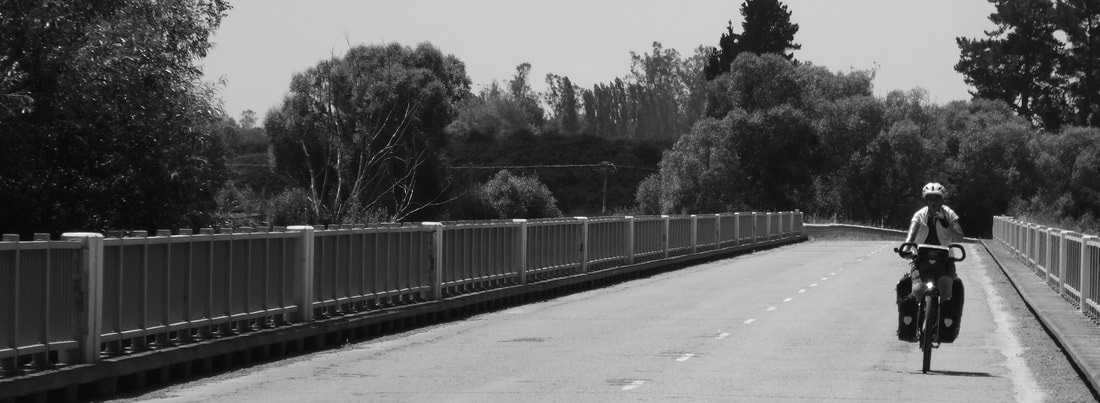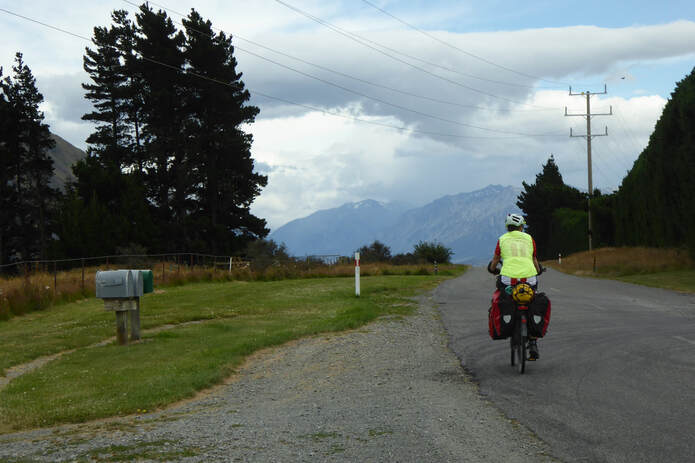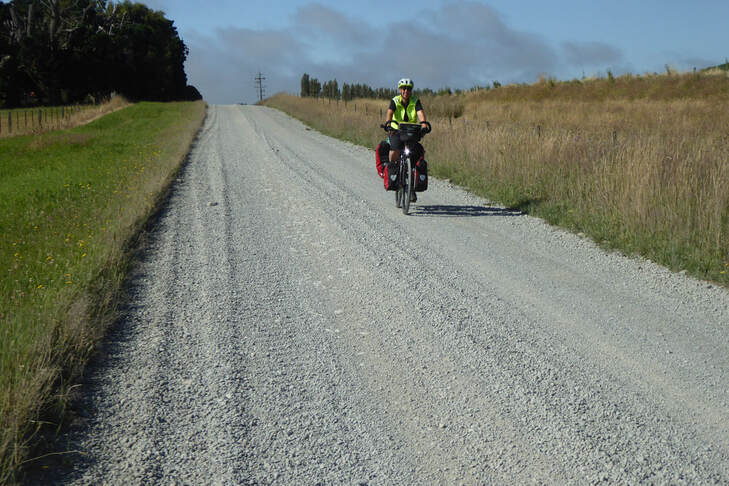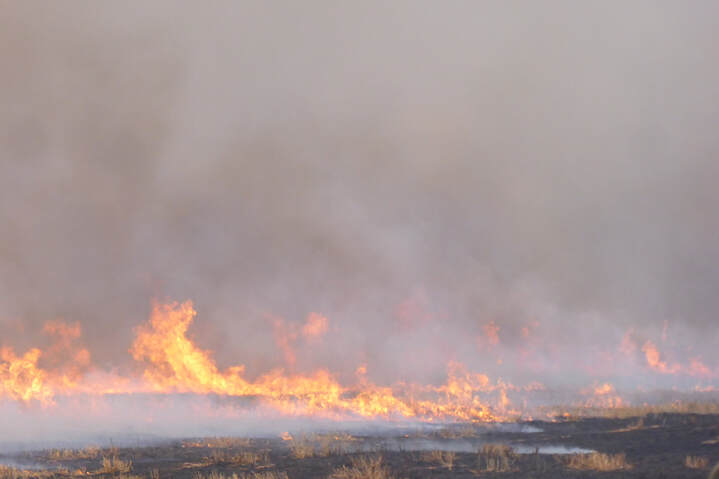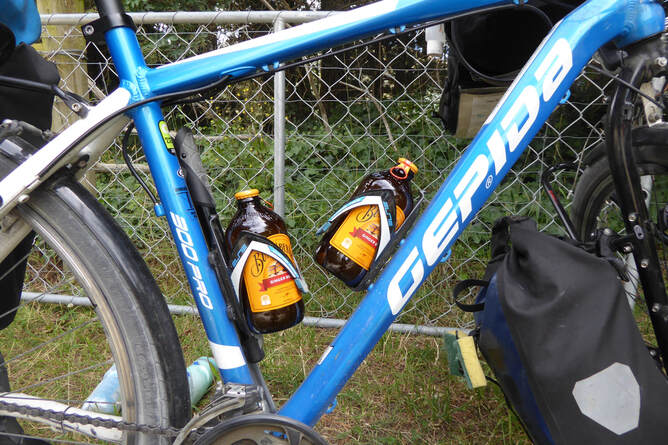The Last Stand
Because it was the last ride on our old bikes
2022.01.14
New Zealand - South & Mid Canterbury
Of popping tar-seal and ginger beer
We cycled through popping sounds as tar-seal melted under us, endured being sprayed with effluent and were stopped when stubble fire smoke obscured the road.
The contrasts were stark as we cycled long, hot afternoons on straight, flat roads for days, then in 12 hours ascended through remote, high country tussock land and pedalled a furious 40km downhill in the rain and gloom.
We met friendly farmers, truckies, barmaids and supermarket workers and with generous permission, pitched our tent in a sheep paddock, scout camp and highway inn backyard.
In mid-January, my husband Kel and I rode our Hungarian Gepida touring bicycles 470km for seven days in South and Mid-Canterbury.
We met friendly farmers, truckies, barmaids and supermarket workers and with generous permission, pitched our tent in a sheep paddock, scout camp and highway inn backyard.
In mid-January, my husband Kel and I rode our Hungarian Gepida touring bicycles 470km for seven days in South and Mid-Canterbury.
"It’s about the journey, not the destination,”
Kel explained to passers-by at the start of our ride, as we fuelled up with a Long Black outside a takeaway cafe in charming Methven.
These locals sometimes pulled up in serious utes. Men wearing jandals or gumboots would march into the cafe, donning their face masks. Everyone was friendly.
Kel described our planned circuitous round-trip from Methven. The locals nodded and occasionally offered affirmation about quiet back roads.
These locals sometimes pulled up in serious utes. Men wearing jandals or gumboots would march into the cafe, donning their face masks. Everyone was friendly.
Kel described our planned circuitous round-trip from Methven. The locals nodded and occasionally offered affirmation about quiet back roads.
Our route avoided the busy State Highway 1 and incorporated the Rangitata and Rakaia Rivers and Ashburton, Temuka, Pleasant Point, Geraldine and Mount Somers, before venturing into the high country, down Porter’s Pass into Darfield and via the Inland Scenic Route back to Methven.
Battling smoke
The first five days, we passed fertile crops and pasture where cattle and sheep grazed. While we didn’t battle much wind, many hedges and other natural windbreaks hinted that at times it must get windy.
It was a sudden change of wind direction which caused a controlled farm burn-off to briefly rage out of control. Flames raced across the stubble and smoke filled the road, so a farm worker stopped us because drivers might not see us.
The flames soon burned out because of the fire-breaks which had already been seared around the paddock’s circumference.
It was a sudden change of wind direction which caused a controlled farm burn-off to briefly rage out of control. Flames raced across the stubble and smoke filled the road, so a farm worker stopped us because drivers might not see us.
The flames soon burned out because of the fire-breaks which had already been seared around the paddock’s circumference.
Finding poo showers
In between the beauty of the fields and the evocative hot macrocarpa scent, we occasionally glimpsed the teal Rakaia or the Pacific Ocean when we travelled south, parallel but not close to it. As morning clouds disappeared, the sea turned bluer, mirroring the vivid sky.
While we appreciated the farmers’ hard work and food production, and their waves as we used our gas stove on roadside verges, there was one downside to riding through an agricultural heartland.
The natural fertility of the Canterbury Plains is increased by the widespread use of automated, moving, wing-like irrigation systems.
We lost count of the amount of times we were sprayed by water and by effluent, which is sometimes put through irrigation systems to fertilise fields.
Compulsory animal poo showers are rather gross! We couldn’t avoid this because we needed to travel on the road and didn’t know whether the spray was water or sewage until we smelt or felt it.
One scorching afternoon after leaving Geraldine, Kel and I encountered another road hazard. We pedalled along with tar-seal melting beneath us because of the heat and poor road quality. It made a ‘pop, pop, pop’ sound.
It was difficult riding as we moved further out into our lane to avoid the sticky tar, while watching for traffic approaching behind. We weren’t going anywhere fast because tar and stones stuck to our tyres.
On my bike, stones jammed up into the mudguard and Kel had to take off the wheel to remove them.
While we appreciated the farmers’ hard work and food production, and their waves as we used our gas stove on roadside verges, there was one downside to riding through an agricultural heartland.
The natural fertility of the Canterbury Plains is increased by the widespread use of automated, moving, wing-like irrigation systems.
We lost count of the amount of times we were sprayed by water and by effluent, which is sometimes put through irrigation systems to fertilise fields.
Compulsory animal poo showers are rather gross! We couldn’t avoid this because we needed to travel on the road and didn’t know whether the spray was water or sewage until we smelt or felt it.
One scorching afternoon after leaving Geraldine, Kel and I encountered another road hazard. We pedalled along with tar-seal melting beneath us because of the heat and poor road quality. It made a ‘pop, pop, pop’ sound.
It was difficult riding as we moved further out into our lane to avoid the sticky tar, while watching for traffic approaching behind. We weren’t going anywhere fast because tar and stones stuck to our tyres.
On my bike, stones jammed up into the mudguard and Kel had to take off the wheel to remove them.
A beautiful ending
Our most beautiful day was the second last, when we ascended from the picturesque Rakaia Gorge Camping Ground.
It was a hard grind on gravel into a head wind, with random dust clouds and wind in the pines meaning we couldn’t rely on seeing or hearing vehicles before blind corners.
However, the view from the top was glorious, of the braided Rakaia. After a lovely ride along a sealed road far above the zealously-teal river, we turned inland towards the mountains.
Previously the most noticeable mountains had been on our left, looking like mammoth barnacles striped in green, grey and brown. Once we passed the Lake Coleridge village turn-off and began Lyndon Road’s gravel, the high country came closer. Or we to it.
Paddocks had already turned from green to golden, edged by purple borage flowers. Eventually this gave way to tussock land of native bush, flax and grasses.
It was dry, remote and the mountains encapsulated the two of us, tiny on our bikes amid a majestic landscape.
As we slowly neared Lake Lyndon and the busier State Highway 73 Porters Pass, the darkening clouds burst and we donned our rain gear, ready for a swift descent to Darfield.
One of many kindnesses shown was by Stu, who slowed his work ute to encourage us during this climb. When Kel and I stopped by a shearing-shed to boil water for our freeze-dried lunch, Stu gave us two bottles of ginger beer, apologising that they weren’t cold.
It was a hard grind on gravel into a head wind, with random dust clouds and wind in the pines meaning we couldn’t rely on seeing or hearing vehicles before blind corners.
However, the view from the top was glorious, of the braided Rakaia. After a lovely ride along a sealed road far above the zealously-teal river, we turned inland towards the mountains.
Previously the most noticeable mountains had been on our left, looking like mammoth barnacles striped in green, grey and brown. Once we passed the Lake Coleridge village turn-off and began Lyndon Road’s gravel, the high country came closer. Or we to it.
Paddocks had already turned from green to golden, edged by purple borage flowers. Eventually this gave way to tussock land of native bush, flax and grasses.
It was dry, remote and the mountains encapsulated the two of us, tiny on our bikes amid a majestic landscape.
As we slowly neared Lake Lyndon and the busier State Highway 73 Porters Pass, the darkening clouds burst and we donned our rain gear, ready for a swift descent to Darfield.
One of many kindnesses shown was by Stu, who slowed his work ute to encourage us during this climb. When Kel and I stopped by a shearing-shed to boil water for our freeze-dried lunch, Stu gave us two bottles of ginger beer, apologising that they weren’t cold.
Days earlier in the hot, intense dairy country, an Ethiopian cattle farm manager and Nepalese farm assistant both filled our collection of water bottles when we slogged past their homes.
On the roads, drivers were mostly courteous, with farmers and truckies the most careful and skilled alongside bicycles. That rainy evening cycling towards Darfield, a Rural Transport Ltd driver showed particular consideration.
As per the road code, this driver waited behind the bikes until he could safely pass, then did so gently and slowly. He’d held back while two oncoming cars, spaced a long way apart, passed us first.
We were grateful, particularly given the tricky conditions and his truck size. Our visibility via bike lights and reflectorised jackets, helmets and panniers likely helped.
So thankful that for others also, it’s about the journey, not only the destination.
On the roads, drivers were mostly courteous, with farmers and truckies the most careful and skilled alongside bicycles. That rainy evening cycling towards Darfield, a Rural Transport Ltd driver showed particular consideration.
As per the road code, this driver waited behind the bikes until he could safely pass, then did so gently and slowly. He’d held back while two oncoming cars, spaced a long way apart, passed us first.
We were grateful, particularly given the tricky conditions and his truck size. Our visibility via bike lights and reflectorised jackets, helmets and panniers likely helped.
So thankful that for others also, it’s about the journey, not only the destination.
